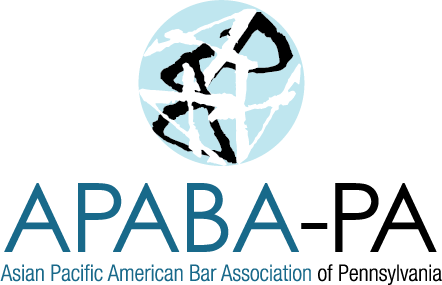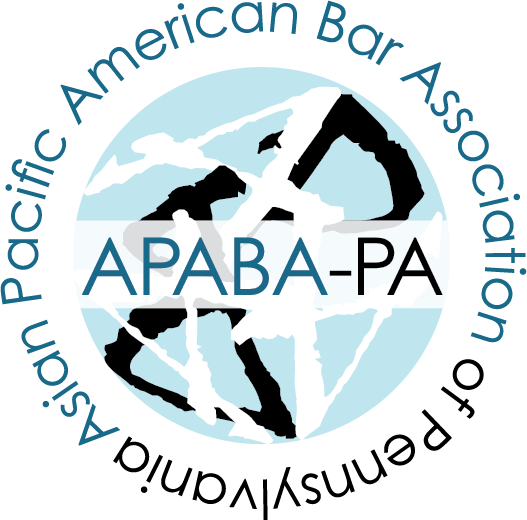APABA-PA Resolution Urging the Pennsylvania Supreme Court and Board of Law Examiners to Welcome Qualified Candidates to the Pennsylvania Bar Regardless of Immigration Status
Pa. High Court Makes DACA Recipients Eligible for Bar Admission
The Pennsylvania Supreme Court adopted a change to Rule 202 of the Bar Admission Rules updating the rule to explicitly say for the first time that those with DACA status are eligible for admission. – The Legal Intelligencer, February 14, 2019
Advocacy Update: The Pennsylvania Supreme Court in February 2019 adopted a change to Rule 202¹ of the Bar Admission Rules, updating the rule to explicitly say for the first time that those with DACA status are eligible for admission. In 2017, APABA-PA drafted and passed a Resolution² urging the Pennsylvania Supreme Court and Board of Law Examiners to welcome qualified candidates to the Bar regardless of immigration status. In that Resolution, we pointed out that Asian Americans had a long history of exclusion from the practice of law based on their national, racial, or ethnic origin, that Pennsylvania historically had denied admission to the state bar due to an applicant’s race, and also that citizenship is not a requirement to practice law in Pennsylvania. APABA-PA also supported the ACLU³ in its representation of Parthiv Patel, a Dreamer, in seeking bar admission. Under then President Bryan Tham, APABA-PA wrote a letter to the Board of Law Examiners urging it to accept all qualified candidates to the bar regardless of immigration status. APABA-PA commends the Pennsylvania Supreme Court in its Rule change that recognizes that all qualified individuals, regardless of immigration status, are valuable contributors to the practice of law and should be granted bar admission.
- Rule 202, Admission to the Bar
- Resolution Urging the Pennsylvania Supreme Court and Board of Law Examiners to Welcome Qualified Candidates to the Pennsylvania Bar Regardless of Immigration Status
- Bar Admission for Undocumented Law School Graduates
APABA-PA’S Support Letter to the Board of Law Examiners for ACLU
February 10, 2017
Resolution Urging the Pennsylvania Supreme Court and Board of Law Examiners to Welcome Qualified Candidates to the Pennsylvania Bar Regardless of Immigration Status
WHEREAS , the Asian Pacific American Bar Association of Pennsylvania (APABA-PA) is committed to advancing diversity and inclusion in the legal profession and to removing obstacles to the profession based on national or ethnic origin; and
WHEREAS, Asian Americans have a long history of exclusion from the practice of law based on their national, racial, or ethnic origin; and
WHEREAS , Asian Americans had a history of exclusion from bar admission in many or all states due to lack of U.S. citizenship, but were barred from U.S. citizenship due to their race; see In re Hong Yen Chang , 84 Cal. 163 (1890), In re Yamashita , 30 Wash. 234 (1902), Ozawa v. United States , 260 U.S. 178, 198 (1922); and
WHEREAS , in 1973 the United States Supreme Court held that barring non-citizen residents from admission to the state bar violated the Equal Protection Clause of the Fourteenth Amendment; In re Griffiths , 413 U.S. 717, 729 (1973); and
WHEREAS , Pennsylvania historically had denied admission to the state bar due to an applicant’s race; see In re Vashon , No. 5 WM 2010, 2010 Pa. LEXIS 940, at *1-2 (Pa. May 4, 2010); and
WHEREAS , as of 2010, there are over 400,000 Asian Americans in Pennsylvania, a 62 percent increase from the prior Census in 2000, and currently 5.9 percent of Pennsylvanians are foreign1 born; and2
WHEREAS , U.S. citizenship is not a requirement to practice law in Pennsylvania; and
WHEREAS , immigrants, and particularly undocumented immigrants, face major barriers in obtaining higher education, including law school education; and
WHEREAS , many immigrants currently without legal immigration status entered the United States with some form of lawful status, such as a visa; and
WHEREAS , numerous immigrants obtain legal status, such as asylum, only after arriving in the United States; and
WHEREAS , many undocumented immigrants were brought to the United States as children and were unaware of their immigration status; and
WHEREAS , the United States Supreme Court has held that all persons within the United States, regardless of immigration status, are entitled to protections under the Fourteenth Amendment, and that children of undocumented immigrants should not be barred from public education, noting that they could not affect their parents’ conduct or their own immigration status; see Plyler v. Doe , 457 U.S. 202, 208, 212, 219-20 (1982);
WHEREAS , being present in the United States without lawful status is not a crime; and
WHEREAS , approximately 180,000 immigrants in Pennsylvania are currently without legal immigration status; and3
WHEREAS , undocumented immigrants are at heightened risk of discrimination and violation of their legal rights; and
WHEREAS , the difficulty of obtaining legal redress is heightened for immigrants who have limited English proficiency and are unfamiliar with the American legal system, and who may fear retaliation; and
WHEREAS , immigrant communities, and particularly communities of undocumented immigrants, are underserved by the legal profession; and
WHEREAS , attorneys with ties to underserved immigrant communities and foreign language skills are well-positioned to help close the access-to-justice gap; and
WHEREAS , 8 U.S.C. § 1621 prohibits states from granting benefits including professional licenses to immigrants without legal status, unless the state affirmatively chooses to opt out of this categorical bar; and
WHEREAS , the New York courts have concluded that this opt-out power is properly exercised by the judiciary rather than the legislature with respect to the licensing of attorneys because New York has conferred plenary authority on the judiciary to set criteria for attorney bar admissions; and
WHEREAS , Pennsylvania has likewise delegated exclusive authority over the licensing of attorneys to the courts; and
WHEREAS , the Supreme Court of Pennsylvania has the power to opt out of the licensing restrictions contained in 8 U.S.C. § 1621; and
WHEREAS , the Supreme Court of Pennsylvania has delegated to the Pennsylvania Board of Law Examiners the responsibility for recommending rules pertaining to admission to the bar; and
WHEREAS , the Board of Law Examiners is responsible for conducting an individualized investigation of a bar applicant’s fitness and qualifications, and is experienced at assigning the appropriate weight and significance to a particular bar applicant’s prior conduct.
NOW, THEREFORE, BE IT RESOLVED that the Asian Pacific American Bar Association urges the Supreme Court of Pennsylvania and the Pennsylvania Board of Law Examiners to opt out of the categorical bar on professional licensing of immigrants without legal status and adopt rules providing for the consideration of admission of qualified candidates to the bar regardless of immigration status.
AND BE IT FURTHER RESOLVED that the President and/or the President’s designee(s) shall communicate the Asian Pacific American Bar Association of Pennsylvania’s position to the Supreme Court of Pennsylvania, the Pennsylvania Board of Law Examiners, the legal profession, and the public, and take such other action as may be necessary to effectuate this Resolution.
ADOPTED: February 8, 2017
1 http://www.census.gov/prod/cen2010/briefs/c2010br-11.pdf
2 http://www.immigrationpolicy.org/sites/default/files/docs/ipc/images/infographics/Pennsylvania2013.pdf; http://www.immigrationpolicy.org/just-facts/new-americans-pennsylvania
3 Pew Research Center, U.S. Unauthorized Immigration Population Estimates,
http://www.pewhispanic.org/interactives/unauthorized-immigrants/.
- On February 18, 2019

